Anyone who tells you that they predicted where this World Cup has already been and knows where it is headed is not being straight with the truth.
The weekend provided two games so full of epic theatre and talking points it’s hard to know where to start – other than to dive straight in.
At the conclusion of Sunday’s extraordinary Pool B match between the Wallabies and Wales, won 29-25 by Wales, both sides stayed on the pitch for an extended period. It had been that sort of contest; some were too exhausted to move, others, like many in the crowd, didn’t want it to end.
Mercilessly, Welsh singer Bonnie Tyler’s It’s a Heartache rang through Tokyo stadium. It could just as easily have been Tyler’s other huge hit, Total Eclipse of the Heart; both told the tale for the Wallabies. Their courageous second-half fightback had bought them so near to victory, but quite not close enough.
Tyler was born Gaynor Hopkins, in Skewen, not more than a couple of hefty punt kicks from Neath. That’s as Welsh as one gets. Unless your name is Alun Wyn Jones, at 34 years-old, now rugby’s most-capped lock forward and Wales’ most-capped player.
Jones used the experience garnered over all of those now 130 Test matches as he cajoled referee Romain Poite into winding down the clock over the last three minutes of what was a pulsating and thrilling contest.
Sitting alongside at their post-match press conference, coach Warren Gatland acknowledged the contribution of his skipper and referred to how his side had, over the last year, ‘grown up’ and come to terms with game management.
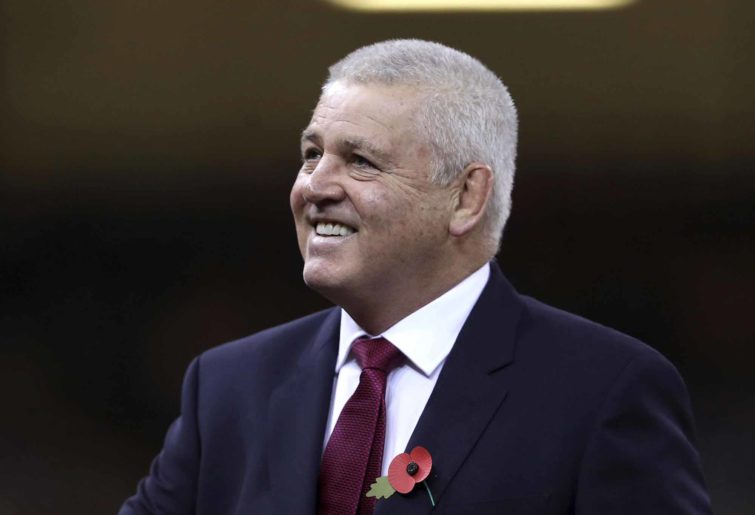
Wales rugby coach Warren Gatland (David Davies/PA via AP)
That’s a fair assessment of where these two sides are in their life-cycle, their understanding of the requirements of Test match rugby, and an explanation for what was a skinny, but ultimately decisive, four-point margin.
This was a wonderful contest, one that until Jones and Poite pulled the handbrake in the 77th minute, comprised periods of ball movement at a breakneck pace where both sides were worthy contributors.
But it was Wales who showed World Cup composure, accumulating points when they were on offer and, in the case of quicksilver halfback Gareth Davies, stealing them when they weren’t. Their error rate was lower and, despite being on the canvas as the Wallabies surged in the second half, they were never out for the count.
The Wallabies had only themselves to blame, taking far too long to establish their pattern of play on the match. Fingers were pointed at the halves, with flyhalf Bernard Foley, save for his spearing kick-pass for Adam Ashley-Cooper’s first-half try, enduring an unhappy match, suffering by comparison to the fluid play of his replacement, Matt Toomua.
But these seeds were sown in the Wallabies approach to the breakdown – an Achilles’ heel throughout Michael Cheika’s tenure – where it took well into the second half for the Wallabies to hit the tackle area with enough consistent vigour and sufficient intent to get their fast recycle game going.
Tolu Latu ran himself into the ground, Nic White started jumping out of halfback, just like he’d done in Perth, and the excellent Dane Haylett-Petty finished off a try that he started several phases earlier. Suddenly Wales were vulnerable.
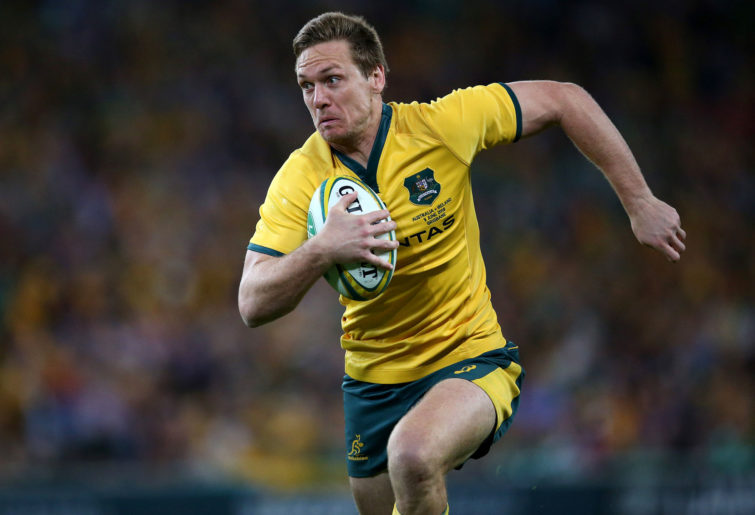
(Photo by Jono Searle/Getty Images)
It was White however who, when he had his hand on the dagger, failed to plunge it all the way. At 25-26, with 11 minutes to play and with all the momentum, Michael Hooper burrowed from a kick-off and White, perhaps reverting to type, declined to send more ball runners at the tired Welsh defence, electing instead to kick.
It’s a scenario common to many sports, where a side or competitor makes a huge comeback, but at the moment where they achieve parity, they pause to reset, or consider the contest started anew, instead of simply charging ahead doing the very same dominant things that got them back in the contest.
White’s kick conceded possession, the Wallabies’ forwards conceded a penalty, and Wales, barely believing their luck, were able to pause for breath and resume control of the final ten minutes.
The contrast in control extended to the press conferences; Gatland and Jones asked a total of 12 questions, 11 of them about pure rugby matters and only one about the officials – which Gatland calmly patted away to short leg.
Cheika and Hooper, however, received only a single question – about Matt Toomua – that wasn’t designed to chisel out a quote that would have us believe the Wallabies were undone by a refereeing conspiracy, or that the game is in the midst of an existential crisis, with match officiating at its heart.
Lazy journalism to be sure, but also a reflection of a society that values short-cycle, eye-catching, headline-driven news grabs. And of course, entirely understandable because of the way Cheika himself elects to run a siege/victim narrative, no matter the truth of a situation.
In that respect, Cheika echoes Trump, where inconsistencies not only don’t matter but are the new reality. Where on one hand he expresses displeasure at officials being unwilling to investigate how Fijian ball carrier Peceli Yato contributed to Reece Hodge’s high contact yet, on the other hand, pillories those officials for daring to stop to investigate his own ball carrier, Samu Kerevi.
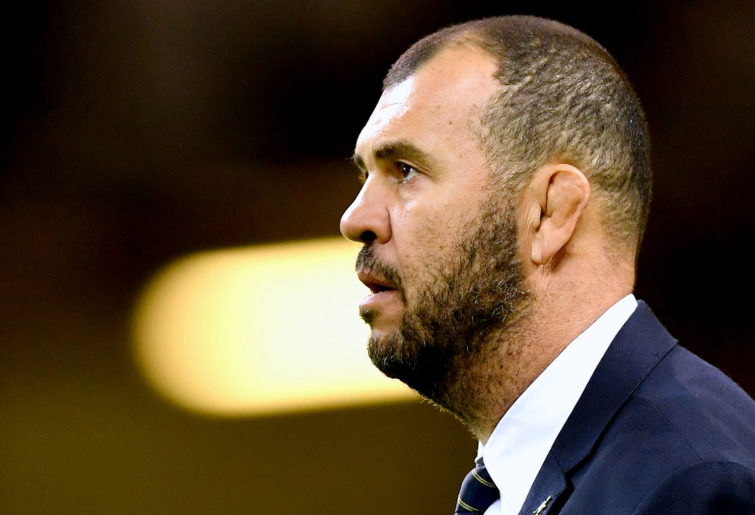
(Photo by Dan Mullan/Getty Images)
Where a statement from Cheika such as, ‘I’m not sure why the officials are worried about that sort of stuff so much’, can’t possibly hope to be reconciled against how his very querying of officials, and the manner in which it is done, contributes to the intense pressure being placed upon them.
As a result, the real story of this World Cup – Japan’s performance on and off the field – is being missed by too many. Instead, bottom-feeders like Phil Kearns and others are given a prominence both they and the game don’t deserve.
Even Fox Sports, a loyal partner of rugby, provided a platform over the weekend for rugby league player Paul Gallen, to tell us that the Hodge situation is ‘the most embarrassing thing I’ve seen’.
This from a player who has been concussed multiple times in his career, playing a sport that has never come to terms with the seriousness of high impact contact to the head, which recently as Friday night, allowed Canberra’s Josh Hodgson to remain on the field despite suffering what was an obvious concussion.
It was unwise of World Rugby to be in the midst of a transformation regarding refereeing of high contact during a World Cup. And it was most certainly unwise for them to make their own public criticism of their referees – who are good men doing a very difficult job, for the most part, very well.
It took some plain speaking from All Blacks coach Steve Hansen yesterday to cut to the heart of the matter; “So there’s no point everybody climbing into them (the match officials) because it’s not going to do anything other than put them under more pressure”.
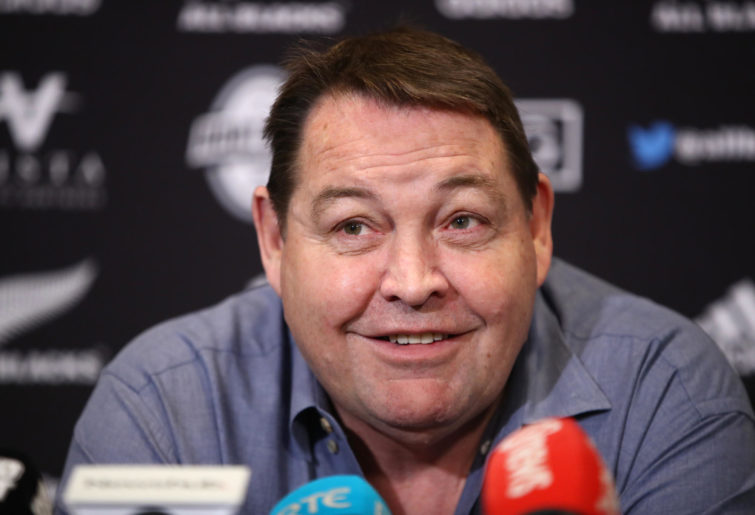
Steve Hansen. The man talks sense. (Photo by Phil Walter/Getty Images)
The sooner that everyone – coaches, media and fans – wakes up to that, and engages with the Cup with a healthier measure of perspective and realism, the better off we’ll all be.
Even if Japan had lost all of their pool matches this would already be a great World Cup. But their 19-12 upset victory over Ireland, and the prospect of them repeating the dose against Scotland in a couple of weeks’ time and topping Pool A, has taken things to another level altogether.
Many things stood out. Japan’s ability to remain unfazed by Ireland’s two-try start and to stick to their game plan, their competitiveness at the scrum, the powerful leg drive shown by Michael Leitch and other ball runners, and the eagerness of their defensive line – which drew raucous cheers of approval, increasing as the game wore on as each Irish runner was chopped down.
Credit too, flyhalf Yu Tamura who, after a muddling kicking display on opening night, got his distribution game right, varying the point of the Japanese attack more cleverly than what his illustrious opponents could manage.
Ireland demonstrably lacked Japan’s energy and were such a spent force by the end, it made Joey Carberry’s decision to raise the flag of surrender and meekly hoof the ball into touch to end the match – as bad as it looked – the only sensible decision.
Bonus points are very likely to be a factor in this pool and, no matter the ‘yellow-belly’ jibes they have had to endure, Ireland were never going 95 metres to draw the match on a miracle play.
Immediately after, some were quick to play the humidity card, citing how many of the Irish pack looked to be drained of moisture as well as spirit.
It’s straw-clutching. While this isn’t Dublin in the depths of winter, it’s also far from the steamy hell endured by Captain Willard endured on his trip up the Tonle Srepok river to flush out Colonel Kurtz. And it didn’t seem to unduly bother European brethren, Wales and Georgia, the next day.
That Ireland coach Joe Schmidt’s knee-jerk reaction was to query referee Angus Gardner’s contribution was disappointing. One because Gardner was accurate and displayed a composed temperament throughout, and secondly because Schmidt drilling straight down on the referee paints him as Cheika-lite when his record justifies far more.
This loss isn’t terminal for Ireland, their schedule (to meet either South Africa or New Zealand in the quarter-finals) is unaltered, their defensive line remains strong, and the red mist that they keep in reserve for special challenges will undoubtedly reappear.
But behind the refereeing smokescreen, Ireland’s confidence must have taken a severe jolt, and Schmidt now has the envious task of taking what looked like an impotent single-dimension attack and turning it into a World Cup-winning one all within a fortnight.
One obvious outcome from this match, coming off the back of the 2015 triumph against South Africa, is that Japan needs to be bought into the Rugby Championship tent as soon as is practicable.
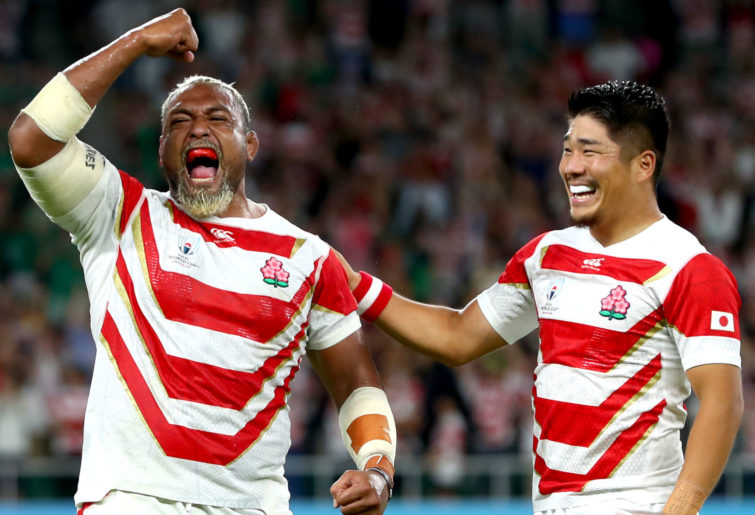
(Photo by Clive Rose – World Rugby/World Rugby via Getty Images)
As always with these things, it’s never as simple as what it appears on the surface, especially with World Rugby’s mooted Nations Championship buried in a cloud of Italian and Scottish self-interest. This was the vehicle, fully funded and more, that would have allowed SANZAAR to fit Japan and Fiji into their Test schedule.
Rugby wise, the need for this to happen is now more pressing than ever. Japan has done the hard yards and dragged themselves from Tier 2 to Tier 1.5, and it would be unthinkable for an exclusive club of leading nations to block their progress.
Japan can bring money and a fast-growing audience to the table, and there must surely be an opening for SANZAAR, World Rugby and rugby’s private equity suitors to conjure together an agreeable variation to what was recently proposed.
Fiji is more problematic – brilliant for the game but with all of their wealth siphoned off to northern hemisphere clubs and individual players, bringing them into the fold is all cost.
Further, with the rugby calendar already bursting at the seams, there is a limit to how the far fiscally challenged Australia and New Zealand unions can go, in forgoing Bledisloe Cup ‘paydays’ to be locked into more matches against Fiji, Japan and Argentina, and potentially, Tonga and Samoa.
With SANZAAR in the process of renegotiating its broadcasting agreements, it’s an issue that can’t be pushed too far into the future.
Especially now, with Japanese rugby so hot – in every sense of the word.

































































































